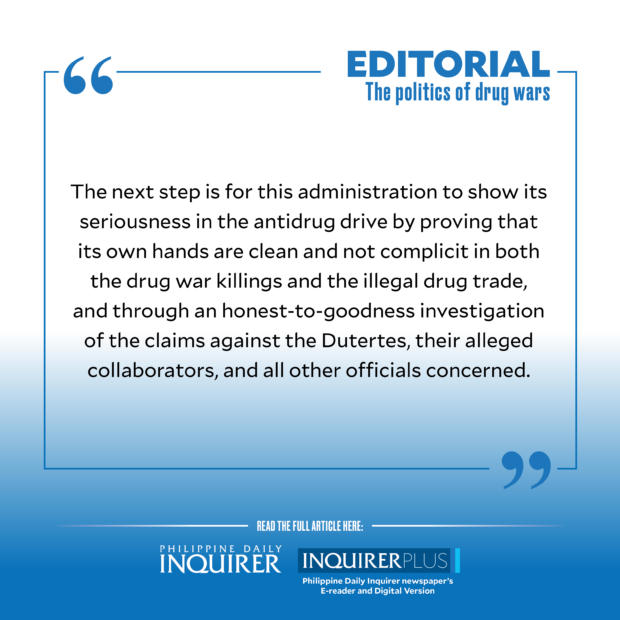The politics of drug wars

The ghosts of drug wars past keep haunting former president Rodrigo Duterte.
One of his accusers now points a finger at two of his grown children: Vice President Sara Duterte, for her alleged role in the bloody antidrug operation known as “Oplan Tokhang,” and Davao City Rep. Paolo Duterte, for his alleged participation in the smuggling of the same illicit substances against which his father had waged a war.
Retired police officer Arturo Lascañas, who disappeared in 2017 in fear for his life after blowing the whistle on the alleged activities of the Davao Death Squad, has resurfaced to ratchet up his accusations against his former boss, amid an investigation by the International Criminal Court (ICC) on one of the most savage drug campaigns in this part of the world.
On top of his claim that Duterte had ordered the killing of drug suspects in his home city and later nationwide, Lascañas alleged that the former president’s children had played important parts on both sides of that operation, one as the progenitor of Tokhang and the other, as its untouchable target.
Blanket denial
Words, of course, are cheap, and we wait with bated breath for the confessed DDS gunman to substantiate his allegations against the Dutertes. That it took him years to implicate the siblings in their father’s alleged crimes gives us reason to pause and take his statements with a grain of salt.
Responding to the allegations, the Vice President issued a blanket denial of ever being involved in extrajudicial killings in Davao. “Without going into any debate, to that witness and to the people behind him: file murder charges against me here in the Philippines,” Sara said.
She questioned Lascañas’ timing, which she said seemed intended to coincide with reports of the ICC investigation and her possible culpability. Her brother Paolo, on the other hand, has yet to address the matter.
It’s understandable to be skeptical about why Lascañas waited this long, considering the gravity of his claims, but it is precisely because his claims are grave that they deserve scrutiny. More so, it underscores the necessity of the ICC investigation to allow witnesses like Lascañas to reveal what they claim to know without fear of reprisal.
During his Zoom press conference from a secret location last week, Lascañas was asked why he decided to come out now. One of his reasons, he said, was: “They’re not in power anymore.”
Exchange of spiteful words
In that respect, Lascañas is mistaken. Duterte may have left Malacañang but his daughter is still vice president, his son a House member, and he remains a powerful figure in his own right—one who can exchange a spiteful word or two with his successor unpunished.
Two Sundays ago, Duterte accused President Marcos of being a drug addict, cocaine in particular, a claim he repeated two days later. In a blistering riposte, the President countered that Duterte’s remarks could be a side effect of fentanyl, a painkiller that the former president had admitted to taking in the past.
The word war has grown so heated that Duterte spoke of having Mindanao, his family’s bailiwick, secede—a statement that would otherwise incur sedition charges were it to come from another politician.
It is important to note that through all this bickering, Mr. Marcos and Sara Duterte, his “UniTeam” partner, have kept the appearance of cordiality, with the former saying his relationship with his Vice President and education secretary remained unchanged, and the latter thankful to the Chief Executive for “respecting my stand.” Note, also, that this feud had been instigated by one side, with another Duterte son, Davao Mayor Sebastian Duterte, firing the first salvo when he called for the President’s resignation on Jan. 28. To this, Mr. Marcos reacted with a bemused equanimity, allowing his lieutenants to retaliate on his behalf.
Honest-to-goodness investigation
As amusing as the tit-for-tat might be, the government must not let itself be distracted.
More and more, the provocations are taking public attention away from the allegations against the Duterte clan, perhaps as its members intended. Worse, the political circus is making a mockery of the government’s rebranded drug campaign, which under Mr. Marcos has focused more on rehabilitative than punitive measures.
The next step is for this administration to show its seriousness in the antidrug drive by proving that its own hands are clean and not complicit in both the drug war killings and the illegal drug trade, and through an honest-to-goodness investigation of the claims against the Dutertes, their alleged collaborators, and all other officials concerned. In this endeavor, whistleblowers like Lascañas must be protected instead of threatened.
Mr. Marcos has declared more than once that he does not recognize the ICC’s jurisdiction. If that is still true, then the opportunity is ripe for his government to prove that the country can truly deliver justice to the thousands killed in the drug war—and let the axe fall where it may.




















